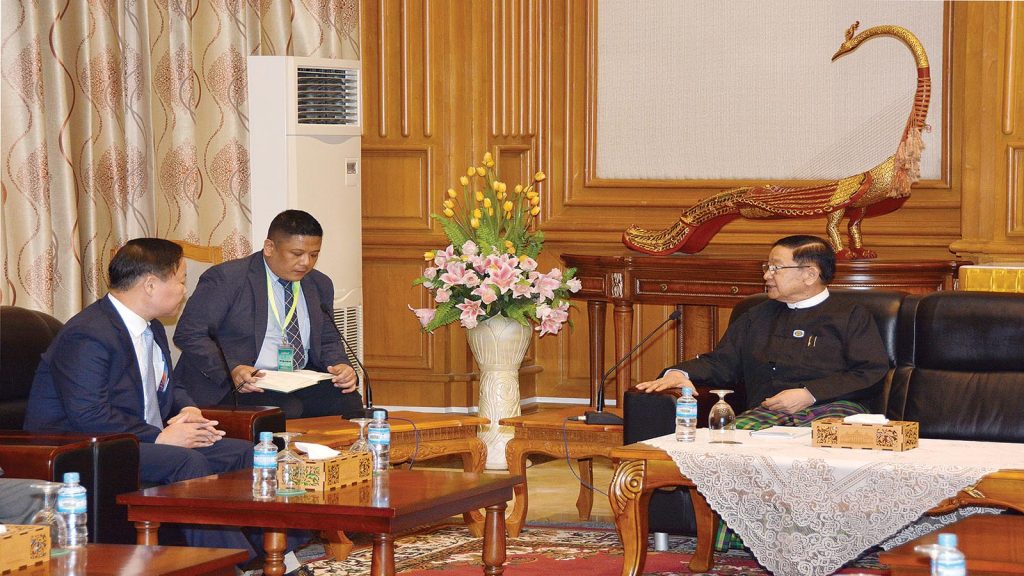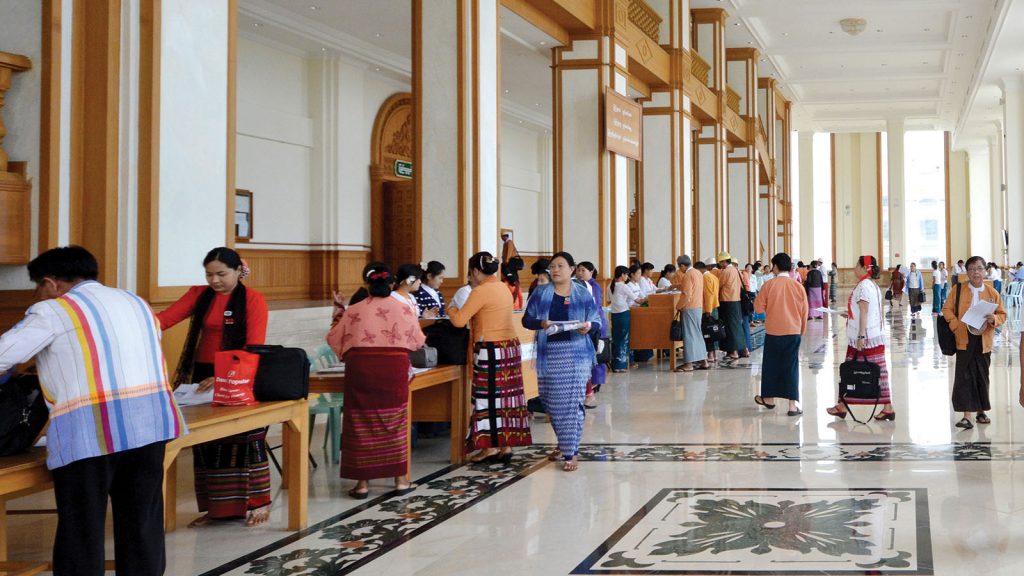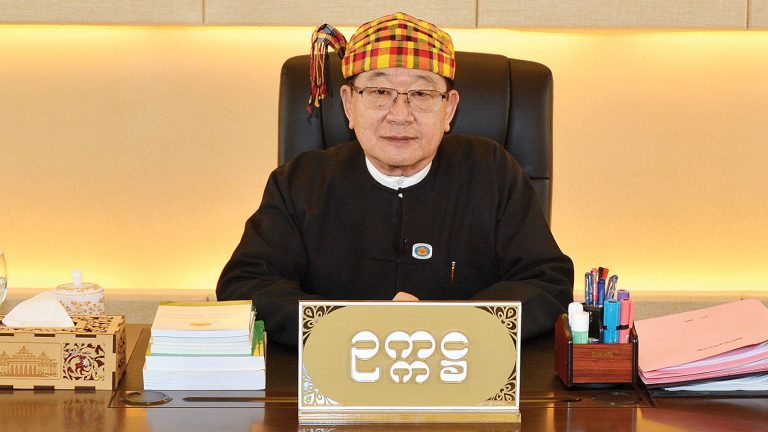7 April
The Hluttaws carry the responsibilities and functions of legislating on national and socioeconomic development, safeguarding public interest and promoting their welfare.

Our Constitution states that the Pyithu Hluttaw shall be formed with 440 Hluttaw representatives consisting of one MP from each of the 330 townships in Myanmar and 110 MPs who are nominated by the Commander-in-Chief of Defence Services. Currently there are 323 MPs in the Second Pyithu Hluttaw, who are independent MPs and individuals who were elected with their representation for 13 political parties, and 110 Tatmadaw MPs.

In addition to standing as a legislating body, the Hluttaw also provides continued support in the Union Government’s peace process. The Hluttaws marked their third year in existence on 1 February 2019. We interviewed Pyithu Hluttaw Speaker U T Khun Myat who is presiding on the Second Pyithu Hluttaw on what they have accomplished in their third year.
Q: Could you tell us what laws were enacted in the third year of the Hluttaws?
A: First, let me say that we lawmakers are working towards the nation’s democratic goals while strengthening the legislative pillar. We do not have any bias nor favour towards any political parties, race, region, or ideologies. You can evidently see us working for legal protection for the public, their safe living and their equal rights for all, especially in our third year.
We enacted laws that will promote the tourism industry and help develop it, such as The Myanmar Tourism Law. We also enacted The Forestry Law and The Myanmar Gemstone Law which intend to conserve our forests and safeguard our natural resources while combating illicit trade of gems and jewellery. These three laws are among the 15 new laws we’ve enacted in the third year. Other than that, we passed 13 amendments to laws, revoked two laws and enacted 9 laws including the National Planning Law, the Budget Law, and the Union Tax Law.
Q: What were the highlights of the questions raised during the Hluttaw sessions? And tell us a bit of the motions tabled and approved.
A: Every MP tries to fulfil the needs of their constituents and the questions they raise in the Hluttaw are for the benefit of the nation and its people. For example, there was the question on the cracks on South Nawin Dam in Paukkaung Township caused by earthquakes and following up on what authorities were doing to ensure the safety of the local residents before the rainy season.
Another significant question was about whether there were plans to review telecommunications service providers for violating consumers’ rights.
Of the 50 motions tabled 24 motions including a motion urging the union government to draw up and implement a plan to raise the socio-economic development of ethnic nationals living in remote and far-off rural areas and a motion urging the government to review the grazing, vacant, fallow and virgin lands and designate as human settlement areas, systematically set up town and village plans to ease the scarcity in living areas caused by rapidly rising population were approved, 22 motions were put on record, a motion not approved and 3 motions not appropriate to be considered.
Q. Explain about forming of committees.
A. Four standing committees – Bill Committee, Public Accounts Committee, Hluttaw Rights Committee and Government Guarantees, Pledges and Undertakings Vetting Committee were formed under 2012 Pyithu Hluttaw Law section 24 while international relations committee; farmers and workers affairs committee; ethnic affairs and internal peace establishment committee; banking and finance development committee; agriculture, livestock and rural social life development committee; education development committee; health and sports development committee; natural resources and environment committee; transport, communication and construction committee; electricity and energy development committee; investment and industry development committee; economy and finance development committee; public affairs management committee; citizens’ fundamental rights committee, judicial and legal affairs committee; complaints and appeals committee; and women and children affairs committee were formed under 2012 Pyithu Hluttaw Law section 27.
Q. What were the arrangements made to ease the Hluttaw representatives’ works in legislative works?
A. Research department provided news and information according to set research policy without regards to party, ideology and preferences to support and ease the work of Hluttaw representatives conducting their legislative works.
During the third one year period of Second Pyithu Hluttaw 355 questions were answered, 23 short papers, 10 short papers on special matters, 21 publications on current affairs and 8 data news letters were prepared and published as well as being contacted and sent by emails. A Research Enquiry Desk was opened to provide research service works.
Q. What was done to raise the capacity of Hluttaw personnel?
A. Pyithu Hluttaw Office, Human Resources Department had drawn up and implemented Human Resources Management Plan and Learning and Development Plan. In addition to this a work process stage of HRD Sub-Strategy project for Myanma Hluttaw Strategic Plan (2019-2022) was being implemented.
During the third one year period of Second Pyithu Hluttaw, a total of 112 Pyithu Hluttaw representatives and Pyithu Hluttaw Office personnel were sent to workshops, meetings and conferences in 21 countries as well as to local workshops, meetings and conferences.
Q. What was the arrangement made to provide the people with timely news and information about Pyithu Hluttaw?
A. Pyithu Hluttaw Office posted news and information about Pyithu Hlutaw on its website https://www.pyithu.hluttaw.mm, on Pyithu Hluttaw Facebook Page and Twitter – PyithuHluttaw@Pyithuwebnews. For Myanmar nationals all over the world Live Streaming of Pyithu Hluttaw meetings were made to provide timely information about Pyithu Hluttaw. News and meetings of Pyithu Hluttaw Speaker, Deputy Speaker, committee chairmen and about Pyithu Hluttaw were being published fully. In addition to these, a link with Myanmar National Portal was made and news about Pyithu Hluttaw Speaker and Deputy Speaker receiving guests were posted.
Q. What must a visitor do to visit Pyithu Hluttaw?
A. A visitor who wanted to visit Pyithu Hluttaw can make online application with an Online Registration Form. Images of visits conducted were also posted on Visit to Hluttaw Facebook Page. During the third one year of Second Pyithu Hluttaw a total of 16,104 local and foreign visitors visited the Pyithu Hluttaw.
Q. Is there anything that you want to add?
A. Hluttaw and Hluttaw representatives were mainly performing legislative duties. During the three year period a Hluttaw calendar for 2018 was drawn up and implemented like all parliaments allowing systematic management and strengthening our country’s democracy base foundation, increasing the protection and benefit to the country and the people, conducting works benefiting the people’s socio-economic and region’s development and resolution of farmland and other land matters.
During the third one year period security of people’s lives, national reconciliation and internal peace were being strived for while laws that were not in line with the time and era were being amended and repealed while new laws were being enacted. To establish a democracy federal union that had been yearned for by the people a joint committee to amend 2008 Constitution was formed according to rules and regulations and all out physical and spiritual efforts were being made toward amending the Constitution. (Translated by Pandarli and Handytips)
By Nandar Win, Photo: Aye Thant


